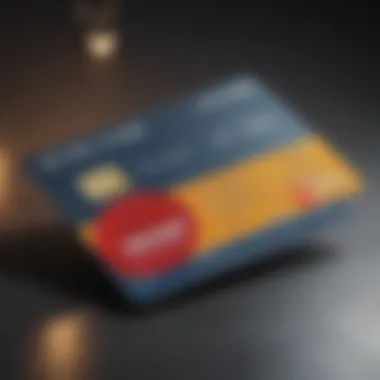Understanding Free Credit Cards with Balance Benefits


Intro
Navigating the complex landscape of personal finance requires a nuanced understanding of various financial products. In this guide, we will scrutinize free credit cards with balances, examining their mechanics, benefits, and who can best utilize them. Credit cards often lure users with the promise of unfettered access to funds, sometimes enticing users with a balance that appears
Prelims to Free Credit Cards with Balance
The concept of free credit cards has gained remarkable traction in recent years. These cards are distinct in that they often come with no annual fees, providing a cost-effective option for consumers. In this article, our focus is to elaborate on the details surrounding free credit cards that offer an available balance. Understanding this topic is critical for individuals seeking to enhance their financial management and improve their credit scores.
Free credit cards with balance present a unique opportunity for consumers. Not only do they alleviate the common burden of annual fees, but they also offer the flexibility to manage personal finances smarter. This is important for those without substantial resources or individuals aiming to make efficient use of their finances.
In the following sections, readers will discover various aspects of free credit cards with balance. Topics range from their functioning mechanism to the advantages they provide. Furthermore, the potential risks associated with these cards will also be discussed.
Key considerations when engaging with free credit cards include understanding hidden fees and charges. Even though a card may market itself as free, the fine print often conceals costs otherwise overlooked. Awareness of these can direct users in making informed choices.
This examination will dive into user experiences and key benefits such as building a credit history and availing rewards. Such incentives can be beneficial for young adults or new borrowers looking to establish their creditworthiness. As the financial landscape continues to evolve, grasping the function of free credit cards becomes ever more critical. Armed with knowledge, consumers may navigate toward better credit decisions and overall financial health.
“Navigating through financial options with clarity is key to making choices that improve one’s economic standing.”
Ultimately, this article will not only clarify what a free credit card with balance is but will also provide guidance on managing one effectively and avoiding common pitfalls. By the end, the intent is for readers to depart with enriched insight on personal finance strategies related to these financial instruments.
What is a Free Credit Card with Balance?
Free credit cards with balance have gained prominence in financial discussions, particularly for individuals looking to optimize their credit management. Understanding what these cards entail is fundamental for recognizing their potential and limitations.
Definition and Characteristics
A free credit card with balance typically refers to a credit card that does not incur an annual fee while also offering an available balance that the cardholder can use to make purchases. They are usually issued by traditional banks, credit unions, or online financial institutions aiming to attract customers by promoting responsibility and offering access to credit without the burden of fees.
Several characteristics define this type of credit card:
- No annual fees: Users do not have to pay yearly payments, helping in cost management.
- Available credit: Cardholders have a line of credit accessible for transactions, enhancing purchasing power.
- Varied features: These cards may offer features such as cash back, reward points, or even promotional rates on certain purchases.
In order to appreciate the implications and utility of a free credit card with balance, it's crucial to understand both how they work and the conditions they often carry.
Types of Free Credit Cards
Free credit cards with balance fall into various categories, each catering to diverse needs and preferences.
- Rewards Credit Cards: These cards provide points or cash back for every dollar spent. They are beneficial for users who frequently use their credit cards for shopping or daily expenses.
- Cash Back Credit Cards: Aimed at individuals looking for monetary returns from their purchases, opting for cash back offers can optimize daily spending without additional fees.
- Interest-Free Period Cards: These allow users to utilize their balance without incurring interest, provided payments meet certain time frames.
- Student Credit Cards: These are tailored for younger users, helping them to start building their credit history without intimidating fees. They often accommodate less strict credit requirements.
An important aspect of each type is recognizing how they fit within one’s financial strategy. Optimally using a free credit card with balance can facilitate better credit health and economic efficiency.
Benefits of Using Free Credit Cards
Free credit cards attract many due to their appealing features. Understanding their benefits is crucial for individuals seeking to navigate personal finance effectively. Free credit cards can contribute positively to one's financial situation if used wisely. Focusing on three significant aspects such as lack of annual fees, aiding in building credit history, and offering rewards or cash back enhances their value. Below, a detailed look at these elements will unfold their importance.
No Annual Fees
One of the primary advantages of free credit cards is the absence of annual fees. Many traditional credit cards charge annual fees that can detract from your spending power. With free credit cards, you can keep more cash available for expenses without worrying about an upfront yearly cost.
This feature is particularly valuable for individuals or families managing tight budgets. Without recurring fees, a more cost-effective route is taken towards using credit. This enables cardholders to invest the saved money elsewhere, like savings or necessary expenditures. Additionally, it assists in focusing on responsible use without the pressure of maintaining card usage to justify fees.
Building Credit History
Using free credit cards is an effective method to build or improve credit history. A strong credit history is crucial for obtaining favorable loan terms, mortgages, and other financing opportunities. When a credit card is used responsibly, timely payments, and maintaining low balances, it reflects positively on credit scores.
Establishing credit history begins with consistent use of a credit card. Each payment made on time contributes to a positive history, demonstrating financial responsibility. Moreover, using only a portion of your available limit can help maintain a favorable credit utilization score. This practice directly correlates with better credit score outcomes. Thus, for those limited in access to credit, free cards provide a pathway to enrich their financial standing.
Rewards and Cash Back Offers
Another compelling reason for choosing free credit cards is access to rewards and cash back programs. Many credit cards are not only free but also offer various forms of incentives for pastel transactions. These rewards commonly include cash back on purchases, travel points, or discounts through partnered retailers.
Cardholders can benefit significantly if they engage with such programs. For example, earning cash back accumulations on everyday purchases fosters smarter financial choices. Similarly, collecting points can facilitate discounted travel long-term. It is essential to analyze the specific offers each card presents to maximize rewards while considering the card's overall impact on your financial managing strategy.


"Understanding the benefits of free credit cards is an essential factor for informed financial practices."
In summary, the benefits of using free credit cards entail eliminating annual fees, fostering an opportunity to build credit history, and offering various forms of rewards to users. As individuals navigate their financial journey, realizing these aspects can enhance decision-making concerning credit management.
Potential Drawbacks
Understanding the potential drawbacks of free credit cards with balance is crucial before making any financial commitment. These cards, while accessible, can come with potential pitfalls that one must navigate carefully. A thorough review of these drawbacks allows one to make informed financial decisions and manage their overall credit wisely.
Hidden Fees and Charges
Many cardholders discover that their free credit card may harbor hidden fees. Charges such as annual fees or service fees can sneak into the fine print. For instance, some cards may offer no annual fee but may charge for foreign transactions or balance transfers.
- Look for possible charges associated with:
- Cash advances
- Over-limit transactions
- Late payment
It's wise to read the terms and conditions thoroughly. This can help prevent unintended debt or costs that ultimately leave you feeling taken advantage of.
Always double-check the terms before deciding on a credit card.
High Interest Rates
Another notable drawback is the high interest rates that often accompany free credit cards. While no annual fee sounds beneficial, it’s essential to consider how interest rates can affect your overall financial situation. If you carry over a balance, these high rates can eat into any potential benefit from the lack of annual charges.
Consider these points regarding interest rates:
- Many free credit cards come with variable rates, meaning they can change based on economic conditions.
- If not paid off each month, accruing interest can lead to significant debt over time.
Always calculate the impact of interest on your expected usage. Knowing this can help you understant if the consider purchasing a certain credit card is smart financial choice.
Impact on Credit Score
Engaging with free credit cards can also have a potential negative impact on your credit score. All credit inquiries can slightly lower scores. Here are some ways a card may influence your financial health:
- Opening a card to take advantage of no fees may lead to increases in available credit. If not managed wisely, this can reflect poorly on your credit risk evaluation.
- Carrying a high balance relative to your credit limit may cause a credit utilization ratio that negatively affects your score, resulting in higher long-term costs.
Understanding the multifaceted impact on credit scores can lead to a more calculated interaction with financial products.
Being informed of these potential drawbacks ensures that individuals making choices in their financial life can effectively manage their relationships with free credit cards.
Eligibility Criteria for Obtaining a Free Credit Card
The eligibility criteria for obtaining a free credit card are critical in ensuring that potential cardholders meet the necessary standards set by financial institutions. Understanding these prerequisites helps consumers make informed decisions and allows for better financial planning. Without meeting these criteria, individuals may face rejected applications, which can negatively affect their credit scores. Each factor plays a role in evaluating the overall suitability of an applicant.
Income Requirements
Income is one of the primary factors considered when applying for a free credit card. Credit card issuers typically want to see that a borrower has a steady and sufficient income to manage their credit responsibly. This income could be from full-time employment, part-time work, or even social security or disability payments.
Having a stable income indicates ability to pay off charges and avoid negative balances. Depending on the card, some issuers may also stipulate a minimum household income. Meeting this threshold is often seen as a way to mitigate the risk for the banks. Documentation such as pay stubs or tax returns may be requested to verify income.
Moreover, it’s important to calculate the debt-to-income ratio. Financial institutions use this ratio to measure how much debt a person already has in relation to their income. A lower ratio generally favors the applicant.
Credit Score Considerations
A credit score is another central component that influences the approval of a free credit card application. It functions as a mirror reflecting an applicant's creditworthiness, indicating their history of managing credit over time. Free credit cards often have varying score requirements, ranging from average to excellent scores.
Aspects of the credit score include:
- Payment history: Timely payments are critical for high scores.
- Credit utilization ratio: This measures how much credit you are using versus your total available credit.
- Length of credit history: A longer history may improve scores, but new users still have the opportunity.
- Credit mix: Having both revolving and installment accounts can showcase a well-rounded credit management style.
For many institutions, those with higher credit scores are seen as lower risk, thus improving chances of obtaining favorable terms on the cards. It’s wise for potential applicants to check their scores before applying.
Age and Residency Restrictions


Another mentioned aspect in credit application processes is age and residency requirements. Generally, card issuers require applicants to be at least 18 years old in order to apply independently. Those under this age may need a co-signer, typically a parent or guardian, to qualify.
Residency is also significant. Most issuers prefer that applicants be a citizen or resident of the country where they are applying. In some cases, proof of residency may be required, such a utility bill or lease agreement.
Applicants can refer to specific eligibility information in the terms and conditions outlined by each issuer to ensure they fully meet all specified criteria. Understanding these requirements allows individuals to prepare ahead of time, increasing the likelihood of their applications being approved.
Potential applicants must understand that each credit card may come with different eligibility criteria, affecting their chances of approval. Knowing your financial landscape can simplify the process.
How to Apply for a Free Credit Card
Applying for a free credit card is an important step in managing personal finances. This process not only requires time and attention but also an understanding of various elements involved in fruitful application. Knowing whether to apply online or in-store, what documents you need, and strategies for success can enhance your chance for approval. This section guides you through these considerations to facilitate smart choices regarding credit management.
Online Applications vs.
In-Store
When it comes to applying for a free credit card, deciding between online applications and in-store options is crucial. Online applications tend to offer extra convenience. You can apply from home, avoiding any need for traveling. Many times, online processes are quicker. When filling out forms online, you can take your time to ensure accuracy.
On the other hand, in-store applications allow for personal interaction with a representative. This possibility can lead to immediate clarification of doubts. In-store also helps if you lack confidence in using digital platforms.
Between the two options, your choice will depend on comfort level and the availability of both methods. Some also might find security tense while sharing personal information online, which is a valid concern.
Documentation Required
Submitting an application requires certain documents. Generally, you will need:
- Proof of identity. This could be a government-issued ID.
- Proof of income. Recent pay stubs or bank statements might suffice.
- Social Security number or Individual Taxpayer Identification Number.
- Contact information including home address and phone number.
People should check standards set by the specific bank or financial institution for precise requirements, as they can differ notably. Well-prepared applications often lead to a smoother approval process.
Tips for a Successful Application
To maximize the chances of a successful credit card application, consider these tips:
- Review your credit score: Know where you stand to avoid applying for cards that you are unlikely to obtain.
- Apply for cards that match your profile: Each institution targets specific groups. Match your credibility with the card requirements.
- Ensure all information is accurate: Errors in applications can lead to delays or automatic rejections.
- Keep application inquiries low: Too many attempts in a short time can lower your credit score.
Remember, preparation lays the foundation for success. By gathering documents early, being thorough and cautious, you create an environment conducive for approval. How you approach the application influences the outcomes.
Understanding how to apply for a free credit card is crucial in shaping your financial future. The convenience of online applications, comprehensive document preparation, and effective strategies significantly impacts approval chances and set the tone for better credit management.
Strategies for Managing a Free Credit Card Balance
Managing a free credit card balance efficiently requires foresight and discipline. With the right approach, these cards can enhance one's financial condition instead of causing troubles. Employing smart strategies provides better control, helping users avoid unnecessary debt and master responsible usage. Here are essential tactics to keep your balance in check.
Setting a Budget
Creating a budget is integral in managing a credit card. A clear budget outlines income and expenditures, which can lead to few surprises. Identify essential spending areas, such as groceries and utilities, while also allocating some discretionary funds. Notice how much can be charged to the card without exceeding monthly limits.
To set a budget effectively:
- Calculate minimum income for monthly needs.
- Track spending patterns.
- Set cap onodot commonplace expenses on credit card usage.
Without a personal financial plan, free credit cards can contribute to debt. In some cases, they may spiral into accumulating balances that lead to high-interest debt traps. Establishing limits in advance prevents falling prey to overspending.
Regular Monitoring of Transactions
Keeping tabs on transactions is key to keeping the balance managed. Vigilant monitoring ensures that nothing goes unnoticed, including unexpected charges. Users can review transactions frequently to confirm accuracy and track spending habits. Payment history should also be scrutinized to rectify errors promptly.
Steps for regular monitoring include:
- Checking your account statements weekly or at least bi-weekly.
- Using financial apps that notify of every purchase.
- Maintaining records of receipts and transactions.
Routinely supervising transactions will let users stay aware of their financial trails, ensuring they do not overspend unwittingly. This can prevent balances from exceeding expectations and can uncover possible fraud.


Paying Your Balance in Full
Paying a credit card balance in full each month is often the most commendable strategy. This tactic helps build a solid credit history while sidestepping interest charges. By doing so, individuals can demonstrate responsible borrowing to creditors, which positively influences credit scores.
Here is how to prioritize full payments:
- Set up reminders just before due dates.
- Establish a nEmergency Fun to cover the card balance when needed.
- Designate automatic payments through bank accounts.
While paying the full balance may seem challenging, it is a practice that yields long-lasting benefits. Creating habits that promote complete payment cycles can enhance financial stability. Ultimately, these habits solidify a pathway toward excellent credit health.
Alternatives to Free Credit Cards
Understanding alternatives to free credit cards can be crucial for personal finance management. These alternatives may offer unique advantages while addressing potential issues that come with free credit cards, like hidden fees or high interests. Identifying these options helps consumers comprehend their financial situation better and choose products that best suit their needs.
Prepaid Debit Cards
Prepaid debit cards function differently compared to traditional credit cards, including free options. Users load money onto the card before using it. It provides control over spending as users cannot exceed the loaded amount.
Benefits of Prepaid Debit Cards:
- No Debt Risk: Since they are not tied to a credit line.
- Budget-Friendly: Users can only spend what is available on the card.
- Reduced Fees: Many prepaid cards have lower fees compared to some free credit card options.
This type of card is an excellent option for those who want to maintain discipline in spending. Consumers looking to keep their financial health intact should examine prepaid debit cards closely.
Secured Credit Cards
Secured credit cards provide another route to manage finances while potentially building credit. They require a cash deposit to serve as collateral, which usually defines the credit limit. It is specifically neat for individuals with limited or no credit history.
Benefits of Secured Credit Cards:
- Credit Building Potential: Responsible usage can improve credit score.
- Fewer Fees: Many secure cards have lower or no annual fees.
- Instant Approval: Often easier to get approved than standard cards.
These factors make secured cards a suitable alternative for individuals aiming to establish strong credit reputations.
Cash Management Accounts
Cash management accounts blend the features of checking and savings accounts with some advantages typically associated with credit cards.
Benefits of Cash Management Accounts:
- Interest Earnings: More interest than standard checking accounts.
- Debit Card Access: Facilitates everyday purchases while earning interest.
- Low Fees: Generally lower fee structures than traditional banking options.
For anyone interested in diversifying their finances, cash management accounts present a favorable choice. Understanding these various alternatives allows individuals to navigate their personal financial landscape with more agility and informed choices.
Ending: Making an Informed Decision
Making an informed decision about free credit cards with available balance is crucial for anyone interested in smart financial management. This topic encompasses various aspects that deserve careful consideration, including benefits, potential risks, and personal financial needs. By fully understanding these facets, readers can empower themselves to make choices that positively impact their credit health.
Well-informed decisions surrounding credit cards directly correlate to financial stability and creditworthiness. It allows individuals to maximize the positive features these cards provide, keep debts manageable, and ultimately enhance their credit scores. Moreover, key information such as fees assessed and rewards programs can greatly influence one's experience with a credit card over time.
In the conclusion of this article, the most significant points have been outlined, reinforcing the necessity of being diligent in research and comparison. Recognizing personal financial goals can greatly aid in determining whether a free credit card aligns with one’s overall strategy.
“The price of ignorance in credit can cost more than any fee.”
Consequently, it is prudent to have an evaluative mindset when absorbing information about these cards. Individuals can benefit from walking through their options systematically, understanding their needs clearly before making any purchases.
Key Takeaways
- Understanding terms and conditions is essential before applying for any free credit card. This knowledge equips users to avoid pitfalls that may arise from unexpected fees or charges.
- Assessing the benefits of available balance can provide great leverage in managing immeditate credit needs. Calculating the rewards vs. costs can help derive maximum possible advantage.
- Determin current financial health and plan accordingly before selecting a balance. It’s crucial to align any credit tools, including cards, with existing budgets.
- Maintain vigilance on transactions and account status to ensure no fees occur which can lead towards irritation and confusion.
- Finally, exploring outside options, like prepaid cards or secured cards, can occasionally present viable alternatives to anyone hesitant or wary of traditional credit card products.
Evaluating Personal Financial Needs
Evaluating personal financial needs is indispensable in the journey towards effective credit card use. Understanding one's situation facilitates informed decisions regarding changes in spending habits or the necessity of acquiring a credit card.
Here are key areas to consider:
- Income Level: Evaluating monthly income provides insight into how much financial room you have for purchases and payment of debt, avoiding localized strains.
- Current Debt: If substantial debts exist, weighing the ramifications of an additional free credit card against this may be necessary for the preservation of financial health.
- Credit Usage Experience: Knowledge of usage instances can indicate familiarity with necessary precautions and prevent point of over-extension in terms of credit limit utilization.
- Long-Term Goals: Planning would be indispensable here; whether aiming for loans related to a house, car, or investment in education, choosing the right credit tools aligns with deadlines and targets as applicable.
Well-considered use of credit cards often leads to improved scores; visitors are encouraged to make careful assessments and comparisons. Contribution is key; aligning financial aspirations and credit enhancements takes planning, insight, and commitment to success.







